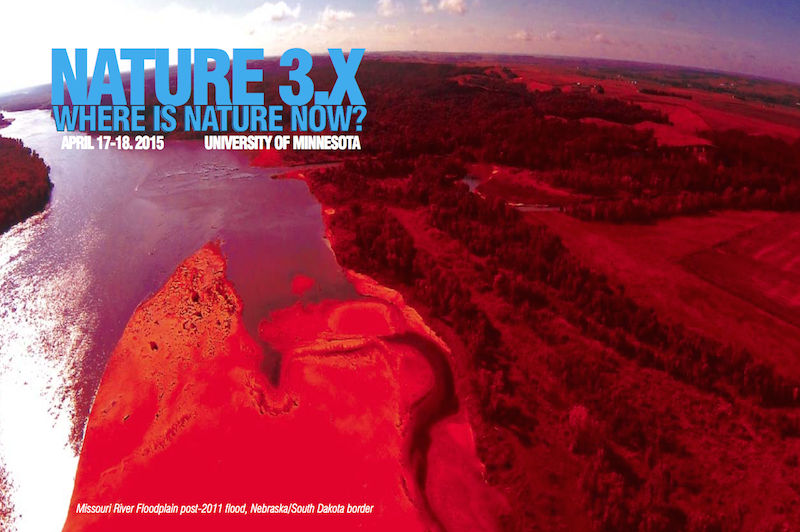This Friday, April 17, marks day one of the Nature 3.x: Where is Nature Now? and opening night of our 2015 Next Generation of Parks™ Lecture Series. Seats for the lecture and symposium are already filled, but did want to delve into some of the topics for those who can’t attend.
Following is the first of two blog posts featuring insights from University of Minnesota Professor and Nature 3.x co-creator, Matt Tucker.
(MPF) What inspired you to create the Nature 3.x: Where is Nature Now? Symposium?
(Matt Tucker) The basic idea of the symposium lies in the tremendous ecological challenges and opportunities we face as we find our way through the second decade of the 21st century. These challenges include food and water scarcity, contaminated land and water, post-peak oil and of course, climate change and its impact on weather patterns, nutrient and water cycles, vegetation and crops, sea levels, energy use, infrastructure…to name a few. These are very complex, globally interconnected issues that are not just “ecological” but also social in that they do not recognize boundaries of age, race, gender and class, nor that of neighborhood, nation or continent. Yet, if we are not careful, these issues can divide as such. Yet, I believe, these challenges also present tremendous opportunities to rethink how we plan, design and manage the world around us.
It is increasingly clear to me that the pressing dilemmas of our Anthropocene epoch are inducing new approaches in how we think about the world around and our place in it. It is a paradigm shift. This shift is occurring across the board- in the natural and social sciences, in the humanities and in planning and design. One topic that has been under a good bit of scrutiny in both the natural sciences and the humanities is the topic of nature. This makes sense because how we think of nature influences how we relate to and shape the environment. Of course, we have a long and complex relationship with the concept of nature. And across time this relationship makes evident the prevailing social attitudes of nature itself, but also the patterns and policies of the built environment. From global treaties on climate change, to the Clean Water Act, down to the everyday choices we make in how we manage our land, what food we eat or what places we travel. It also influences how we plan and design our landscape, from the scale of regions and continental watersheds to the scale of local infrastructure, parks or open space, and buildings. Over the past several centuries the prevailing attitude is that nature and culture are essential counterparts, but ultimately separable. Nature is “out there” in the wilderness of time and space, something unfettered by humans…or if need be, sustainably so. This attitude is now becoming distant and strange given our increasing awareness and acceptance of human impact on Earth’s systems. It’s hard to see a separation between nature and society when our fingerprints are all over the map, or in this instance- the entire Earth.
So the symposium arises from an idea that to move forward in the Anthropocene we must begin to have some conversations across disciplines about what this future may look like. It may mean some old ideas get put on a shelf, other ideas may get an update, and- what’s most interesting to me- some speculative and powerful new ideas may emerge. Along with those ideas, what are the words that we use to describe this new awareness of a post-natural world? And what do these places look like and what approaches get us there? So bringing it back to the idea of how we relate to our new awareness of the world around us, I think we must first ask a different question, and that is: “Where is Nature Now?”.
(MPF) What do you hope participants will get out of the experience?
(Matt Tucker) You can’t enter into a critical discourse about complex topics like nature or the Anthropocene without asking some challenging questions or suggesting some controversial directions forward. It can be exciting, but at times uncomfortable, to re-consider what you believe and hold to be true. So my advice is: don’t attend if you aren’t prepared to walk out of Northrop seeing and thinking about our post-natural world in an entirely different way.
Featured image courtesy of Matt Tucker

